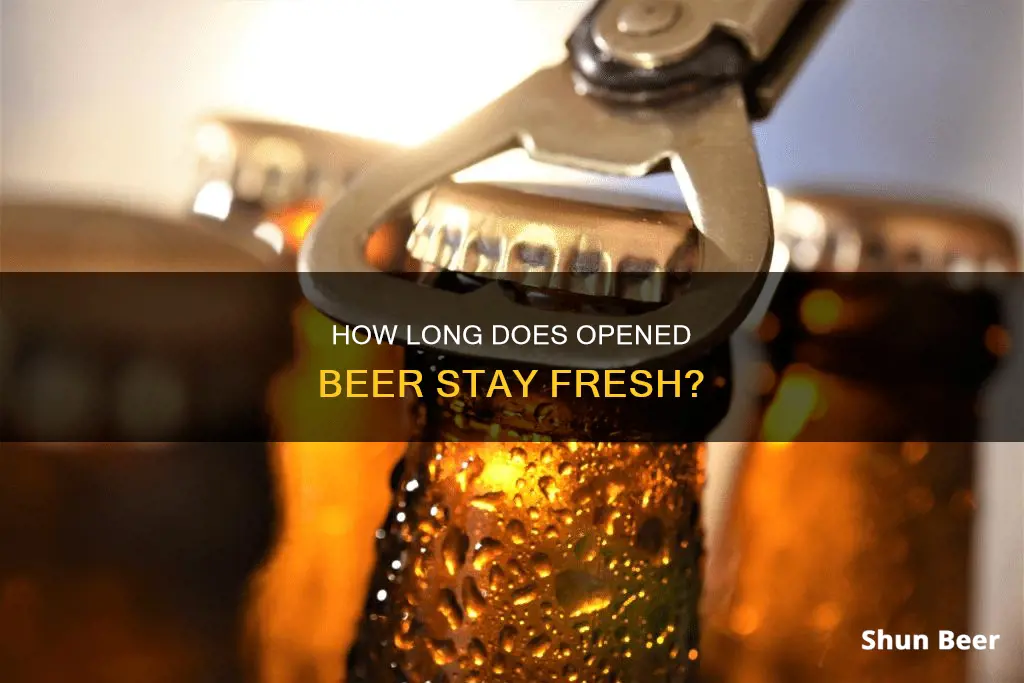
Whether you're a beer aficionado or just enjoy the occasional cold one, you've likely wondered: how long can an opened beer last? The answer depends on several factors, including the type of beer, storage conditions, and time elapsed since opening.
In general, an opened beer is best consumed within 24 to 48 hours if kept cool and away from light. Lighter beers, such as lagers and pilsners, are more susceptible to spoilage and should be prioritised for consumption. On the other hand, darker or higher-alcohol content beers, like stouts and porters, exhibit greater resilience due to their robust flavours and alcohol's preservative effect.
One of the primary concerns with opened beer is oxidation, which occurs when the beer is exposed to oxygen, leading to potential flavour degradation and a stale or flat taste. Additionally, carbonation loss occurs over time as carbon dioxide escapes, impacting the beer's texture and overall character.
Proper storage can help extend the life of an opened beer. It is recommended to refrigerate immediately and seal tightly with a stopper, plastic wrap, or a rubber band to minimise air exposure.
While drinking an opened beer after a few days may not pose immediate health risks, the taste will likely suffer, and it may become flat and unpalatable. Therefore, it is advisable to consume opened beers within a day or two to enjoy them at their optimal flavour and freshness.
| Characteristics | Values |
|---|---|
| How long does opened beer last? | Beer should be consumed within a day or two of opening. |
| Beer storage | Beer should be stored in a cool, dark place, away from temperature fluctuations and direct sunlight. |
| Beer oxidation | When left open, beer begins to oxidize, resulting in changes in its colour, appearance, aroma, and taste. |
| Beer spoilage | Beer spoilage is caused by increased exposure to air, light (especially UV rays), and bacteria. |
| Beer expiration | Beer does expire, but it doesn't become unsafe to drink. Expired beer will have unpleasant tastes and aromas. |
What You'll Learn

Is it safe to drink an opened beer left out overnight?
It is generally considered safe to drink an opened beer that has been left out overnight, although it may be flat and not taste as good.
Beer is best consumed within 24 to 48 hours of opening, and it is recommended to store it in a cool, dark place to maintain its quality. If the beer is left out at room temperature, its freshness will decrease more quickly, and it may develop an unpleasant taste due to oxidation.
However, drinking an opened beer that has been left out overnight is not likely to be harmful to your health. The main concern is the potential for flavour degradation, which can occur due to oxidation and carbonation loss.
It is important to note that beer can go bad if left out too long, as it may become contaminated by bacteria and other microbes. Therefore, it is recommended to avoid drinking beer that has been sitting out for more than a week.
Additionally, beer that exhibits signs of spoilage, such as an unpleasant flavour, a musty smell, or visible mould, should be discarded.
Beer Hawk: Craft Beer Discovery and Delivery
You may want to see also

How long does an opened beer last in the fridge?
Beer is a popular alcoholic beverage, and its shelf life depends on several factors, including whether it's open or not, and the type of beer. Normal beers, as long as they are unopened, can last at least half a year and will taste fine after opening, provided they were stored properly. However, once a beer is opened, it is best to drink it within a day or two. After that, the beer will be flat, and its taste will be far from what you expected.
To ensure that opened beer lasts about a day or two, it should be stored in a cool place, like a refrigerator, and kept tightly covered. Beer doesn't like light, so it's best to store it in a dark place where sunshine can't reach it. Exposure to sunlight can cause a chemical reaction in the beer, breaking down its flavour components until it smells and tastes like skunk spray. This is why beer exposed to sunlight for too long is said to have been "skunked" or "lightstruck".
Overexposure to oxygen also negatively affects beer. Bottled beer is at a higher risk of oxygen exposure than canned beer, and storing beer upright minimises contact with the air. Keeping bottled beer on its side makes it prone to air leaks.
Bacteria are an unusual culprit as it's hard for them to survive in beer due to its high alcohol content, which acts as a natural preservative. However, if bacteria get into the beer, they will eat away at it.
While expired beer is unlikely to make you grievously ill, it may give you a stomach ache, and the taste is likely to be the biggest disappointment as it will be flat, skunky, or just dissatisfying.
Chicago Beach Beer Drinking Rules Explained
You may want to see also

How to store opened beer?
Beer is a popular alcoholic beverage, but it's important to know how to store it properly if you want to make it last. Here are some tips on how to store opened beer:
Keep it away from light
Beer does not react well to light exposure. If beer is exposed to light, it can become "skunky", which is evident in its taste. Beer is often sold in dark bottles to reduce the impact of light, with dark brown bottles offering better protection than green bottles. If your beer is in a bottle, store it in a dark place where sunlight cannot reach it. If it's in a can or a keg, it's already safe from light damage.
Keep it cool
It's important to store beer in a cool place, such as a pantry or refrigerator. Colder temperatures help to preserve beer, and alcohol maintains its preservative qualities at room temperature. However, refrigeration is particularly important for opened beer, as it will slow the rate of carbonation loss.
Seal it tightly
To prevent oxidation and the loss of carbonation, it's crucial to seal opened beer containers as tightly as possible. Use a stopper, foil, plastic wrap, or the original cap to create an airtight seal. The longer the beer is left open, the more carbonation it loses, so it's important to act fast. If using foil or plastic wrap, add a rubber band for an extra seal.
Store it in an airtight container
If possible, transfer your beer to an airtight container before storing it in the fridge. This will help to prevent oxidation and preserve the beer's flavours, aromas, and carbonation. If the original container is large and only partially full, move the beer to a smaller bottle to reduce the air gap.
Consume within a few days
Even when stored properly, opened beer will only last a few days before it starts to taste flat and stale. Beer stored in the refrigerator will typically last 1-3 days before losing most of its quality. Without proper storage, it will go bad even faster due to oxidation, resulting in an unappealing taste and aroma.
Horse Beer Drinking: What's the Deal?
You may want to see also

What happens to an opened beer left out?
When a beer is left out open, it starts to lose its freshness and its flavour starts to deteriorate. The clock starts ticking on a beer's freshness as soon as you expose it to the elements. The shelf life of an open beer depends on a variety of factors, including temperature, light exposure, type of beer, and alcohol content.
Temperature
Temperature plays a crucial role in determining an open beer's shelf life. Lighter beers, such as lagers and pilsners, are more susceptible to higher temperatures, which can accelerate spoilage by promoting faster oxidation and carbonation loss. On the other hand, darker or higher-alcohol content beers, like stouts and porters, have a slightly higher resistance to temperature fluctuations due to their robust flavour profiles and the preservative effect of alcohol.
Ideally, open beer should be stored at typical refrigerator conditions, between 35°F and 46°F. Storing beer at room temperature will significantly reduce its freshness and increase the risk of decomposition.
Light Exposure
Light, especially UV rays, can also negatively impact beer quality, causing a condition known as "lightstrike." Beers with higher hop content, such as IPAs, are more prone to this issue, resulting in a skunky aroma and taste. Clear and green glass bottles offer little protection against lightstrike, so it's best to store beer in brown bottles, cans, or kegs to minimise light exposure.
Type of Beer and Alcohol Content
The type of beer and its alcohol content also play a role in its shelf life post-opening. Beers with lower alcohol content and delicate flavour profiles, such as wheat beers and light ales, are more prone to spoilage and flavour degradation when left open. In contrast, beers with higher alcohol content, like barley wines and imperial stouts, act as a natural preservative, extending their shelf life. However, even these stronger beers can experience changes in nuanced flavours over time, making proper storage essential.
Oxidation and Carbonation Loss
Two of the main factors affecting the taste, aroma, and overall enjoyment of an open beer are oxidation and carbonation loss. Oxidation occurs when beer is exposed to oxygen, leading to potential flavour degradation and a stale or flat taste. Carbonation loss also diminishes the beer's effervescence, affecting its overall character.
An open beer can typically sit out for about 30 minutes to 2 hours before it becomes flat and unpalatable due to oxidation. However, this can vary depending on temperature and light exposure. To maximise the shelf life of an open beer, it's best to refrigerate it immediately and seal it tightly to minimise air exposure.
In terms of safety, an open beer can usually be consumed within 24 to 48 hours if kept cool and stored in a dark place. However, the flavour and quality of the beer will start to deteriorate after this timeframe, and it may develop an unpleasant taste and aroma.
Honey's Magic in Beer: The Science Behind It
You may want to see also

What are the signs of an opened beer going bad?
Opened beer is susceptible to a few factors that can cause it to go bad. These include oxidation, UV exposure, temperature, and bacterial contamination. Here are some signs that your opened beer has gone bad:
Strange Taste or Odor
The most obvious sign of bad beer is a strange taste or odor. This could be anything from a metallic, sour, or cardboard-like flavor to an unpleasant smell, such as skunk or urine. These undesirable flavors and odors are often a result of bacterial contamination or extended exposure to oxygen.
Cloudiness
Cloudiness in beer can indicate the presence of bacteria, which can cause proteins and other compounds to clump together, resulting in a cloudy appearance. However, it's important to note that not all cloudy beers are spoiled, as some craft beers may have a hazy appearance for flavor and texture.
Flatness
Beer losing its carbonation and going flat is a sure sign that it has been exposed to oxygen and has likely gone bad. This is more common in beers left open for an extended period or not properly sealed.
Vinegar Taste
If your beer develops a vinegary taste, it's a sign that bacteria have gotten into the beverage. This is more common in beers that have been left open or exposed to temperature fluctuations.
Mold Growth
While it's rare for unopened beer to have mold due to its alcohol content and low pH, issues during the bottling or canning process could result in mold growth. Additionally, some craft beers may undergo wild fermentation, where initial mold growth is intended. However, if mold persists or appears anytime after the initial fermentation, it indicates spoilage.
Dark or Discolored Appearance
An opened beer that has gone bad may also appear darker or cloudier than usual. This could be a result of oxidation or bacterial growth.
It's important to note that the shelf life of opened beer depends on various factors, including the type of beer, storage conditions, and exposure to oxygen. Most beers are best consumed within 1-2 days of opening, as they will start to lose their carbonation and flavor. However, drinking an opened beer left out overnight or after a few days is generally safe and won't pose any health risks.
Beer and Gout: What You Need to Know
You may want to see also
Frequently asked questions
Yes, you can drink an opened beer that was left out overnight. It likely won't taste as good, but it won't make you sick.
An opened beer has a shelf life of about a day or two in the fridge. If it isn't stored properly, it will last even less.
An opened beer should be consumed within a day or two at room temperature.
To store an opened beer, seal the container tightly and put it in the refrigerator.







